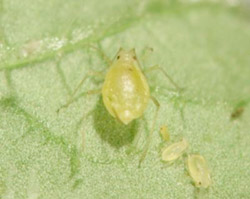Rapid evolution within single crop-growing season increases insect pest numbers

This image shows a female Green Peach Aphid clone with a line of her clonal daughters soon after live birth (older clones are bigger). Credit: M. Turcotte.<br>
New research by scientists at the University of California, Riverside shows that evolution – genetic changes in populations over time – can occur so rapidly in organisms that its impact on population numbers and other aspects of biology can be seen within just a few generations.
The research, published online Aug. 9 in Ecology Letters, the highest ranked journal in the field of ecology, can improve scientists' ability to predict the growth and spread of endangered species, invasive species, and disease epidemics.
Working on aphids, considered the world's most important crop pest, the researchers experimentally tested the impact of rapid evolution on wild populations within a single crop-growing season. To accomplish this, the researchers set up an experiment that prevented evolution by natural selection from occurring in some aphids while allowing it in others. They then compared the rate at which the non-evolving and evolving populations grew.
Each fall, aphids undergo one generation of sexual reproduction. The following spring, they begin multiple generations of asexual reproduction. During this period multiple clonal lineages compete, leading to changes in gene frequencies and mean trait values in the population in the process.
In their field experiment, the researchers compared replicated aphid populations that were non-evolving (single clone, thus genetically identical) to aphid populations that were potentially evolving (two clones genetically different from each other and with dissimilar growth rates).
As the populations grew, the researchers tested whether the mixed populations evolved. Counting aphids repeatedly, they found that clones rapidly changed in frequency, within 30 days or 4-5 aphid generations. They then tested the impact of this evolutionary change on the ecology of the aphids. They found that evolving populations grew in number up to 42 percent faster than non-evolving populations.
“This shows that even without human interference natural selection acting on aphid populations causes rapid evolution,” said Martin M. Turcotte, who led the research as a graduate student in ecology, evolution and organismal biology at UC Riverside. “Even stronger effects might be expected when pesticides are in use. For decades, evolution was deemed too slow and, hence, it was not considered when studying population growth – an oversight that needs to be corrected. Ignoring this evolution, as is not currently uncommon, can lead to predictions that greatly underestimate pest densities and outbreaks.”
Rapid evolution could have important untested impacts in many other applied areas. For example, rapid evolution is important in fisheries where intense fishing causes fish to evolve traits that let them escape fishing nets. Antibiotic resistance and increased virulence in pathogens are examples where rapid evolution impacts human health.
The study was conducted at the University of California Motte Rimrock Reserve where the researchers collected multiple clonal lineages from a wild aphid population feeding on mustard plants. They identified clones and characterized their intrinsic per capita growth rates in a greenhouse at UCR.
Turcotte graduated with a doctoral degree in biology from UCR this year. Currently a postdoctoral scholar at the University of Toronto at Mississauga, Canada, he uses experimental evolution to study fundamental questions about the ecology and evolution of plant-herbivore interactions.
He was joined in the research by his co-advisors at UCR: David N. Reznick, a professor of biology, and J. Daniel Hare, a professor of entomology. A few UCR biology undergraduate students also assisted the research team.
Turcotte was funded by grants from the Natural Sciences and Engineering Research Council of Canada; Fonds de Recherche du Québec and the University of California Natural Reserve System. Grants from the U.S. National Science Foundation supported Reznick and Hare in the study.
The University of California, Riverside (www.ucr.edu) is a doctoral research university, a living laboratory for groundbreaking exploration of issues critical to Inland Southern California, the state and communities around the world. Reflecting California's diverse culture, UCR's enrollment has exceeded 20,500 students. The campus will open a medical school in 2013 and has reached the heart of the Coachella Valley by way of the UCR Palm Desert Graduate Center. The campus has an annual statewide economic impact of more than $1 billion.
A broadcast studio with fiber cable to the AT&T Hollywood hub is available for live or taped interviews. UCR also has ISDN for radio interviews. To learn more, call (951) UCR-NEWS.
Media Contact
More Information:
http://www.ucr.eduAll latest news from the category: Agricultural and Forestry Science
Newest articles

Nerve cells of blind mice retain their visual function
Nerve cells in the retina were analysed at TU Wien (Vienna) using microelectrodes. They show astonishingly stable behavior – good news for retina implants. The retina is often referred to…

State-wide center for quantum science
Karlsruhe Institute of Technology joins IQST as a new partner. The mission of IQST is to further our understanding of nature and develop innovative technologies based on quantum science by…

Newly designed nanomaterial
…shows promise as antimicrobial agent. Rice scientists develop nanocrystals that kill bacteria under visible light. Newly developed halide perovskite nanocrystals (HPNCs) show potential as antimicrobial agents that are stable, effective…



